(4) Gender and Inclusive Growth
A. Promotion of Women’s Empowerment and Participation
The social norms and systems in developing countries are generally shaped by men’s perspectives, which renders women to be put in vulnerable positions in many aspects. Although certain progress has been seen in women’s participation in fields such as education, politics, and economy compared to the early 2000s, when the Millennium Development Goals (MDGs) were established, there are still many countries where it cannot be said that women have the same opportunities as men to participate in decision-making processes, which is not restricted to the public sphere such as high-level government decision-making, but also includes family and other private decision-making.
On the other hand, women are critical actors of development, and their participation will lead not only to the improvement of their own lives but also to more effective development. For example, improving the literacy of women who have had little or no educational opportunities so far, increases their access to correct information on public health and prevention of infectious diseases such as HIV/AIDS. This leads to appropriate family planning and promotes women’s social advancement and economic empowerment. Moreover, it contributes to the inclusive economic growth of developing countries.
The 2030 Agenda for Sustainable Development (2030 Agenda) adopted at the United Nations Summit in 2015 strongly and clearly expressed that “Realizing gender equality and the empowerment of women and girls will make a crucial contribution to progress across all the Goals and targets.” Moreover, Goal 5 of the SDGs seeks to “Achieve gender equality and empower all women and girls.” Gender equality and promoting women’s empowerment are essential for realizing “quality growth.” For this purpose, it is important for men and women to participate equally in all phases of development cooperation and to reap the benefits equally.
●Japan’s Efforts
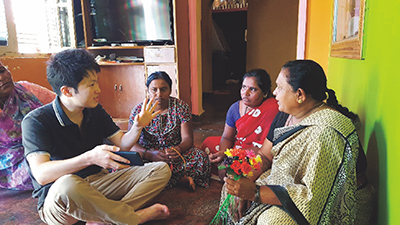
A Japan Overseas Cooperation Volunteer introducing how to make cocoon crafts to members of a women’s self-help group for silk farmers in India (Photo: JICA)
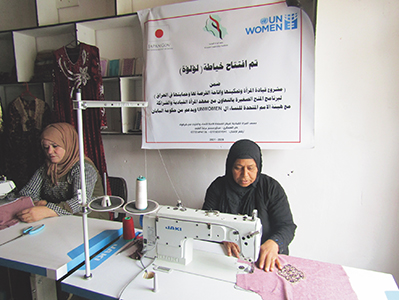
Women receiving vocational training through Cash for Work assistance at the Kirkuk refugee camp in Iraq (Photo: UN Women)
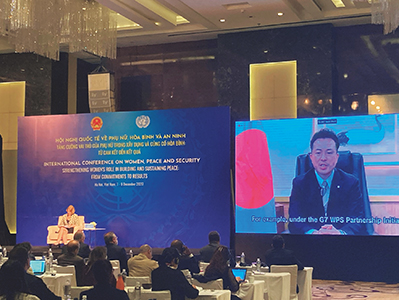
A video message by State Minister for Foreign Affairs Uto being played at the International Conference on Women, Peace and Security (WPS) held by the Government of Viet Nam and the UN (December 2020)
In order to make the 21st century a world with no human rights violations against women, Japan has been advancing its efforts in the international community to promote gender mainstreaming Note 34 and women’s empowerment by setting the following three priority fields: (i) promoting women and girls’ rights, (ii) improving an enabling environment for women and girls to reach their full potentials, and (iii) advancing women’s leadership in political, economic, and other public fields.
In March 2018, Japan contributed $50 million to the Women Entrepreneurs Finance Initiative (We-Fi)*, whose launch was announced at the G20 Hamburg Summit. By assisting women entrepreneurs and women-owned and led small and medium-sized enterprises (WSMEs) in developing countries to overcome various obstacles they face (such as access to finance and legal systems and regulations that are disadvantageous to women), this initiative aims to promote the prompt economic independence of women in developing countries and their social and economic participation, and to realize regional stability, reconstruction, and peacebuilding. At present, We-Fi has implemented projects across 39 countries. Moreover, in March 2019, Japan held the Fifth World Assembly for Women (WAW!) at the same time as the meeting of Women 20 (W20), a group led by the private sector that makes proposals to the G20 for enhancing the economic activities of women. During the meeting, then Prime Minister Abe stated that Japan would provide opportunities for quality education and human resources development to at least four million girls and women in three years until 2020 in order to expand opportunities for education among women in developing countries. Furthermore, at the G20 Riyadh Summit in November 2020, Prime Minister Suga welcomed the commencement of activities of “EMPOWER,” an initiative of the private sector for the advancement of women in leadership positions, whose launch was agreed at the G20 Osaka Summit in June 2019.
Japan also provides assistance through UN Women. Japan provided approximately $18 million in 2019 and approximately $22 million in 2020 to contribute to initiatives for the political participation and economic empowerment of women, the elimination of sexual and gender-based violence against women and girls, a stronger role for women in the peace and security fields, and the strengthening of gender responsive policies and budgets, among others. For example, in Iraq, for the empowerment of women at the Kirkuk refugee camp, comprehensive and high-quality health management and livelihood support were provided for 2,382 women who were victims of ISIL, and through Cash for Work Note 35 assistance, 80 women were paid wages in exchange for engaging in sewing, food processing, and other labor. Additionally, in 2020, 11,600 masks were made by hand and sold by women in the refugee camp in order to prevent COVID-19 infections. Furthermore, 50 women were trained in necessary skills for leadership and 40 were provided with sewing machines. Moreover, psychosocial support such as counseling and awareness activities regarding legal rights were conducted for 2,302 women and girls, and among them, improvements were seen in awareness of and access to services, as well as recovery from stress of psychological trauma caused by conflict and the COVID-19 pandemic.
Japan considers that sexual violence in conflict cannot be tolerated. Therefore, Japan places importance on collaboration with the Office of the Special Representative of the Secretary-General on Sexual Violence in Conflict of the UN (OSRSG-SVC) Note 36. In 2020, Japan provided over $1 million in assistance to the OSRSG-SVC for projects in Central Africa, the Democratic Republic of the Congo, Mali, Nigeria, Somalia, and South Sudan, and has been contributing to preventing sexual violence and strengthening response capacity through comprehensive support including improving the judicial system to punish perpetrators and support systems for victims of sexual violence related to conflict.
Furthermore, based on the view that in order to realize a peaceful society more effectively, it is vital to integrate a gender perspective and to secure women’s participation in all stages of conflict prevention, conflict resolution, and peacebuilding, Japan established its National Action Plan for the implementation of United Nations Security Council resolution 1325 on Women, Peace and Security (WPS) and other relevant resolutions in 2015, and has been implementing the Plan. In March 2019, the revised version was formulated. Moreover, under the G7 WPS Partnership Initiative agreed upon at the G7 Foreign Ministers’ Meeting in 2018, Japan chose Sri Lanka as its partner country, and from FY2019, Japan, in cooperation with the embassies of each G7 country in Sri Lanka, has been assisting the country with the formulation of its WPS Action Plan and also providing assistance in the field of health centered on reproductive health and for the financial empowerment of Sri Lankan women, including women who became widows due to the internal conflict over the past 26 years.
Through these efforts, Japan will continue to cooperate with other countries for achieving the empowerment of all women and girls, gender equality, and a society and system in which men and women support each other.
Zimbabwe
Emergency Grant Aid for Three Countries in Southern Africa Affected by Cyclone Idai
(Capacity Building on Prevention of Sexual Abuse and Exploitation and Menstrual Hygiene Management in Cyclone Idai Affected Districts in Zimbabwe)
Emergency Grant Aid (April – October 2019)
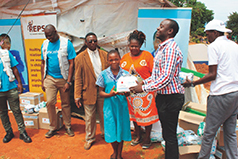
Students receiving menstrual hygiene management kits distributed in cyclone-affected districts of Manicaland Province (Photo: UNICEF)
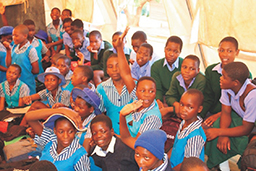
Students attending a class on menstrual hygiene management (Photo: UNICEF)
In Manicaland Province in the eastern part of Zimbabwe, a cyclone that hit the area in March 2019 caused landslides and flooding, affecting approximately 270,000 people. While emergency disaster response measures were taken in the region, including the establishment of campsites as temporary shelters, there were concerns over an increased risk of abuse and violence against women and children and the deterioration of the hygienic environment.
In light of these concerns, Japan provided $600,000 in emergency grant aid to Zimbabwe, of which $150,000 was allocated to a UNICEF project to prevent sexual abuse and exploitation and improve menstrual hygiene management in cyclone-affected districts.
As part of this project, UNICEF Zimbabwe focused on women’s menstrual hygiene management which was often overlooked in past emergency disaster relief efforts, conducted activities for local residents to acquire knowledge and deepen understanding of hygiene management, and distributed 4,000 menstrual hygiene management kits. Each kit contained three pieces of underwear, one comb, one toothbrush, one tube of toothpaste, one kilogram of soap, 30 disposable sanitary napkins, and five reusable sanitary napkins. Educational activities were also conducted to prevent abuse and violence and protect children from these risks.
As 2019 was also the year when the Government of Zimbabwe conducted a nationwide survey on menstrual hygiene management, Japan’s contribution came to be widely known to the Government of Zimbabwe, NGOs, and international organizations. In addition, based on the experience of the project, UNICEF Zimbabwe is considering incorporating support for improved women’s hygiene management in future emergency assistance projects through distribution of menstrual hygiene management kits and is working with relevant local organizations to enable domestic procurement of the contents of the kits within Zimbabwe.
- *Women Entrepreneurs Finance Initiative (We-Fi)
- An initiative launched by the World Bank with 14 participating countries, aiming to support the economic independence of women in developing countries and to promote their social and economic participation by implementing support to overcome the challenges which women entrepreneurs and women-led SMEs in such countries face including access to finance, legal systems, and others. The types of assistance We-Fi provides include financial access assistance for women entrepreneurs, advisory service for financial institutions to facilitate greater business with women entrepreneurs, and technical assistance to improve the legal and regulatory systems of developing countries. The initiative is aiming to make more than $1 billion in funds available, with approximately $350 million from donor countries and additional resources from the private sector and international financial institutions.
B. Reducing Disparities (Assistance for People Who Tend to be in Vulnerable Situations)
Ongoing efforts are being made to implement initiatives toward the achievement of the SDGs. Meanwhile, a number of issues such as the difficulty in identifying where problems lie and addressing them properly from the broader national level are gradually being brought to light. Even when responding to the “increase of disparities,” similar problems exist. Challenges such as poverty, conflicts, infectious diseases, terrorism, and natural disasters have varying impact depending on the situations that individuals are in, including their country and region, or whether they are women and/or children.
The spread of COVID-19 has had a major impact particularly on the survival and livelihoods of all people placed in socially vulnerable positions. Moreover, it has been pointed out that schooling opportunities among the most vulnerable people will be restricted and women will have negative social and economic impacts, and this will lead to further growing disparity and abuse. In order to deal with this situation, it is effective to adopt an approach that takes the standpoint of individual people, which is also indispensable for the realization of a society that fulfills the principle of the SDGs, “no one will be left behind.”
For example, as part of its cooperation on measures against COVID-19 in the ASEAN region, Japan signed an investment agreement to provide funds to microfinance institutions (MFIs) through the COVID-19 Emerging & Frontier Markets MSME Support Fund operated by Blue Orchard Finance Ltd. The cooperation aims to improve financial access and maintain employment for micro, small, and medium-sized enterprises (MSMEs), mainly women-owned businesses affected by COVID-19, and contributes to the empowerment of women, low-income people, and MSMEs (see “Project Introduction Column” for details).
●Japan’s Efforts
... Assistance for Persons with Disabilities
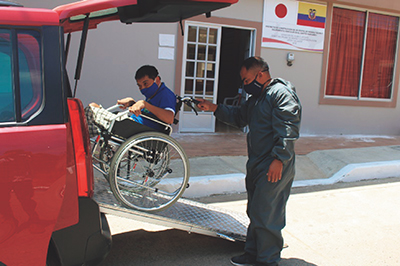
Transporting a person with a physical disability to a rehabilitation center in a car donated by Japan in Ecuador
In order to ensure the social participation and inclusion of people in vulnerable situations in society, especially persons with disabilities, Japan pays due attention to the socially vulnerable, including persons with disabilities, when planning and implementing ODA policies. Policies for persons with disabilities cover a number of different fields, including welfare, health and medical care, education, and employment. Japan has applied the techniques and experiences it has accumulated in these fields for measures and policies for persons with disabilities in developing countries through ODA and NGO activities.
For example, Japan carefully carries out its assistance to suit various local needs through incorporating barrier-free design in the planning of railroad and airport construction, developing vocational training centers and rehabilitation facilities, providing minibuses for their transportation, and other measures. Additionally, Japan provides a wide range of technical cooperation through JICA to enhance the capacity of organizations and personnel providing assistance to persons with disabilities. These efforts include the acceptance of trainees from developing countries and dispatch of JOCVs and experts such as physical and occupational therapists and social workers (see below Project Introduction Column regarding JOCVs’ activities).
The Convention on the Rights of Persons with Disabilities ratified by Japan in 2014 has a discrete clause which stipulates that state parties would undertake measures for international cooperation and its promotion (Article 32). Japan continues to contribute to improving the rights of persons with disabilities in developing countries through ODA and other means.
Nicaragua, Saint Lucia
Self-reliance Support for Visually Impaired Persons by Other Visually Impaired Persons, Japan Overseas Cooperation Volunteer Passing on Correct Oriental Medicine Techniques from Hand to Hand
(1)(2) Senior Volunteers (Nicaragua), (3) Japan Overseas Cooperation Volunteers (Saint Lucia)
(1) 2010 – 2012, (2) 2013 – 2015, (3) On standby in Japan (3rd batch in 2019)
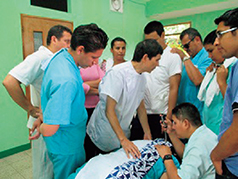
Mr. Tsunakawa passing on Shiatsu techniques to his visually impaired students from hand to hand at the University of Oriental Medicine Japan-Nicaragua in Managua, Nicaragua
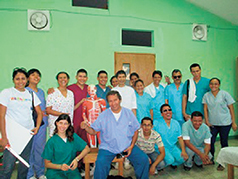
At a lecture on Anma attended by students who completed the Shiatsu course at the University of Oriental Medicine Japan-Nicaragua
Mr. TSUNAKAWA Akira, an acupuncture and moxibustion massage practitioner, is a visually impaired person who has taught at a school for visually impaired persons in Japan. Mr. Tsunakawa has been dispatched twice to Managua, the capital of Nicaragua in Central America, as a Senior Volunteer.
Oriental medicine, which does not rely on drugs to treat conditions such as back pain and stiff shoulders, was attracting attention in Nicaragua. However, there was a lack of human resources who could teach correct treatment methods of the medicine. To address this gap, Mr. Tsunakawa has produced 20 Shiatsu (Japanese acupressure therapy) and Anma (Japanese massage therapy) practitioners by giving them a total of approximately 500 hours of lectures of basic medicine, Shiatsu and Anma techniques, as well as clinical practice at the University of Oriental Medicine Japan-Nicaragua in Managua, Nicaragua.
In particular, he taught practical skills to students so that each of them could obtain a job and become self-reliant, while considering factors such as the degree of each student’s disability. In addition, he has produced two instructors with total blindness, acknowledging the importance of Nicaraguan instructors.
“At times, it made me feel sad to know that there were disabled people begging on the streets in between traffic. However, I was so impressed to see that my students, who had cheerfully walked to the lectures with white canes on roads without manhole covers, eventually became Shiatsu practitioners and were supporting their families and households,” Mr. Tsunakawa said about his activities in Nicaragua.
From his experience in Nicaragua, Mr. Tsunakawa realized that support for visually impaired persons by other visually impaired persons not only gives them hope for the future by demonstrating the goal of self-reliance directly and concretely, but also has a significant impact on raising awareness of people toward issues regarding disabilities. Hoping to utilize his experience and skills again in a new location, he applied for post for a JOCV in Saint Lucia, an island in the Caribbean, and secured it. He is currently preparing for dispatch to the country in Japan.
... Assistance for Children
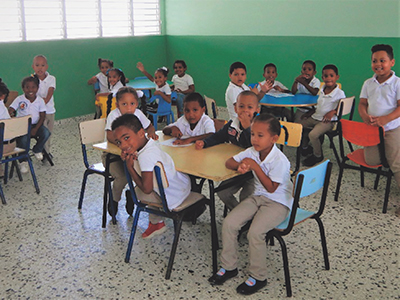
Children in class at an early childhood education facility in El Pozo, the Dominican Republic, which was built through Grant Assistance for Grass-Roots Human Security Projects
Generally, children tend to be in vulnerable situations, and today, there are many children around the world that have been placed in harsh environments due to the impact of COVID-19 in addition to conflicts, natural disasters, etc. Also, the number of refugee and internally displaced children is rapidly increasing, and Japan is providing a variety of humanitarian and development assistance bilaterally and through international organizations. In 2020, through the United Nations Children’s Fund (UNICEF), Japan assisted by providing supplies to prevent COVID-19 infections and technical cooperation for health workers, implementing awareness activities on infection risks, and through other support for 66 countries in the Asia, Middle East, and Africa regions.
Additionally, through the Grant Assistance for Grass-Roots Human Security Projects Note 37, Japan provides cooperation that directly benefits residents at the grassroots level. Under this scheme, Japan is implementing projects which contribute to improving the living conditions of children, such as the construction and refurbishment of elementary and junior high schools, provision of medical equipment to hospitals, and development of wells and water supply facilities.
For example, in Thoung Ninh Commune, Thanh Hoa Province, Viet Nam, Japan is cooperating in the construction of a new school building that is resilient to natural disasters at Thuong Ninh Elementary School, which has many ethnic minority children. It is expected that this assistance will improve the learning environment for 443 children who could not take sufficient classes due to classroom shortages and will also contribute to creating an educational environment resilient to natural disasters. In addition, in Colombia, Japan provided assistance to the municipality of Toluviejo in Sucre Department for the construction of a new municipality-run children’s library building. This is expected to improve the reading and literacy education environment for the approximately 22,000 people, including approximately 5,000 children, in the municipality.
In Malawi, although the number of school children rapidly increased after the government made primary education free in 1994, the construction of school facilities to meet the sudden rise in school children all over the country has been significantly delayed. Under such circumstances, Japan has supported the Kapalamula Primary School in Dedza District in constructing three buildings with six classrooms, refurbishing the floors of four existing classrooms, and installing 300 two-person desks, which is expected to improve the learning environment for 2,096 children and the classroom management environment for 40 teachers.
Japan also signed an Exchange of Notes with Cambodia concerning the grant aid “Project for the Prevention of and Response to Violence against Children in Cambodia (through UNICEF)” in January 2019. Under this project, Japan is strengthening the communication skills of social workers and medical professionals, who actually come face-to-face with the children, as well as conducting training that is recognized worldwide for the eradication of violence for the government officials of Cambodia. As of 2020, approximately 1,200 government officials, social workers, and medical professionals have undertaken the training, which is expected to lead to a reduction in physical violence in educational settings, etc. and to improvement of the environment in which children who have suffered physical violence can easily consult with counselors.
Additionally, with regard to the Kyrgyz Republic, Japan signed an Exchange of Notes concerning the grant aid “Project for Enhancing the Resilience of Children to Climate and Disaster Risks (through UNICEF)” in March 2020. Through this project, Japan is installing equipment for disaster risk reduction at approximately 600 schools in the country, as well as creating and distributing disaster risk reduction manuals and conducting evacuation drills for approximately 1,800 schools. As a result, it is expected to mitigate natural disaster risks for approximately 900,000 children and improve disaster risk reduction capacities with schools serving as base.
Furthermore, in Afghanistan, Japan signed an Exchange of Notes regarding the grant aid “Project for Infectious Diseases Prevention for Children” in November 2020. This cooperation enables vaccinations for approximately 1.43 million babies under the age of one, approximately 3.19 million women in the reproductive age group, and approximately 10 million children under the age of five through support for the provision of vaccines for routine immunizations scheduled in 2021 as well as a polio vaccination campaign aimed at infants. Furthermore, it is also expected that the steady implementation of these campaigns for routine immunizations and the polio vaccine will contribute to preventing infections and deaths from preventable diseases and improve the health of children and women in the reproductive age group across all of Afghanistan (see also “Polio” and “Project Introduction Column” for details on support for polio prevention and eradication).
- Note 34: Integrating gender perspective into all policies, measures, and projects in order to achieve gender equality in all fields. In the field of development, it refers to the process to clarify development challenges, needs, and impacts on both men and women, at all stages of planning, implementation, monitoring and evaluation, of all policies, measures, and project, based on the premise that they have different impacts on men and women.
- Note 35: A method for supporting the independence of victims or displaced people during times of natural disasters and humanitarian crises by temporarily employing them and paying wages for their labor.
- Note 36: Japan’s efforts regarding the prevention of sexual violence in conflict can also be found on MOFA’s website (https://www.mofa.go.jp/fp/hr_ha/page23e_000466.html).
- Note 37: Details of the program and past achievements can be found on MOFA’s website (https://www.mofa.go.jp/mofaj/gaiko/oda/files/000071826.pdf).
